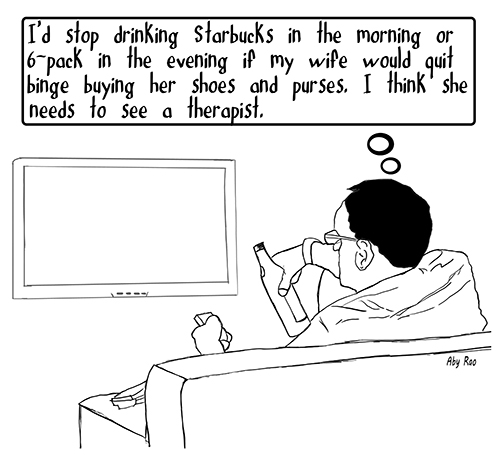
I will be the first one to admit that I am not able to do everything that I am going to suggest here as wasteful spending, nevertheless, notwithstanding my shortcomings, there are many wasteful things we do and then we realize afterwards that indeed those could have been avoided. If you spend some time thinking about this, you will also find wasteful things to add to the list as well.
Dr. Robert J. Shiller, an Economist and a Noble Laureate and who has many firsts associated to his name in the world of economics, always talks about how we waste our money. One of his big complaints is that’s why some people buy big houses. Most people don’t need to have big houses to live comfortably but also there is a long list of wastes associated with a big house and many of those items are inconspicuous.
A big house means a bigger mortgage, which means greater interest charges, bigger property taxes, possibly larger heating and cooling bills, along with maintenance of yards/landscape and inside of the house (cleaning, furnishings etc.). This list could be long. If you have a large family and many dependents along with lots of social activities, then perhaps you need one until the need is gone. The important thing is to be cognizant of the fact that there are many hidden costs associated with unnecessarily owning a big house.
Even though Dr. Shiller has many pet peeves, I will mention just a few here. Some things are as mundane as coffee and bottled water. These two items makes one wonder about every day waste. There’s a simple solution. We can make coffee at home and avoid expensive coffee shops. Many of these store coffees cost about $4 or higher. If you have to have one or two every day, as so many swear by it, then you are looking at an expense of roughly $1,460 annually for one cup or twice that if you have to have one in the evening as well. All of a sudden it is a lot of money, should I say, wasted for whatever little pleasure we may be getting out of it.
And we know the story on bottled water already because it is discussed in the media all the time. Everyone is lugging that little 500ml bottled water with him/her which would cost about $1 in retail (less in bulk) and we drink that all the time. It is established beyond much doubts that tap water, at least in developed countries is as good as, if not better, as the bottled water, but we still want to keep paying roughly $1 per bottle which might add up to $700 to $1,000 per year. Coffee or bottled water, we don’t think much about it when we buy one or two every day but looking at it as an annual expense it stands out as a lot of waste.
There are many such everyday items that can be mentioned. Some of those are subscriptions to health clubs, frequent and unplanned trips to the grocery store, impulsive purchases like purses, clothes, shoes or that $2,000 Peloton bike which hardly gets used. If you put your mind to it you too can come up with your own list.
I really want to turn my attention to some other items from the financial world now because that is also another area where much waste happens. Credit card debt will be one of them. Dave Ramsey, who is very well known about his views on getting rid of the debts, has a popular radio program, gives lectures and seminars on that subject. His message is very simple: Tighten your money belt and get out of your debt. In other words be debt free. We have heard of outrageous late charges that our own banks charge if we are even a day late for our scheduled payments. We know about very high interest rate credit card companies charge (anywhere from 14 percent to 21 percent) and yet many of us have no serious plans to get out of that kind of debt burden. I will not even ask why we get into that situation in the first place.
Most of us have our assets managed by someone who charges an annual fee of at least one percent of your assets. That one percent charge, as a number, does not look high but if you convert that into dollars you will be astounded. Let us take an example. If someone, other than you, is managing, say $1 million of your assets, then their charges annually at a one percent rate will $10,000. This is a big number, and if your money has been managed like this for the last five years, say, then you have already shelled out $50,000+ of your hard-earned money. If you have sizeable assets then you may have some negotiating room to reduce those annual charges. The real alternative to this is to do investments yourself. This is easier said than done but it is possible with a little bit of earnest personal effort and some help from an expert and let me assure you many have done it.
If you just make your sincere list of waste and add up the amounts, it will likely be large. The only question we need to ask is whether whatever pleasure you got out of it was worth the price.
———
Mo Vidwans is an independent, board-certified financial planner. For details visit www.vidwansfinancial.com, call +1 (984) 888-0355 or write to mpvidwans@yahoo.com.



